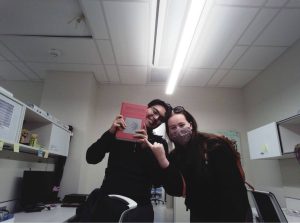 “I did chemical biology research building RNA-based tools starting the second semester of my freshman year until the middle of my junior year. I loved the work, but I realized that I didn’t want to go into that field. I don’t want to pursue a Ph.D. and I don’t want to get a medical degree. And, I don’t really want to work as a chemistry lab tech beyond my undergrad, though I really enjoyed it for the time I did it! While I really enjoyed the analytical and applicative components of STEM research, I realized that I enjoyed the interpersonal interactions I got to have within my research position most.
“I did chemical biology research building RNA-based tools starting the second semester of my freshman year until the middle of my junior year. I loved the work, but I realized that I didn’t want to go into that field. I don’t want to pursue a Ph.D. and I don’t want to get a medical degree. And, I don’t really want to work as a chemistry lab tech beyond my undergrad, though I really enjoyed it for the time I did it! While I really enjoyed the analytical and applicative components of STEM research, I realized that I enjoyed the interpersonal interactions I got to have within my research position most.
I definitely wouldn’t have learned what I really wanted to do if I had not been able to do that research. I always recommend people do research because you won’t know about the application of what you are learning unless you’re able to use those skills while you’re in your undergrad. I would have gone through my whole degree, gotten a job and been like, ‘Wait! This isn’t for me!’
I did two and a half years of a biochem degree at the U while also double majoring in psychology. Now I have pivoted towards that psychology side and I’m also completing a degree in political science. I am planning to graduate this upcoming spring. I wanted to set myself up for success in a different field. I’m conducting research in a different lab now, doing work in social and health psychology. Even though I chose a different path, I will always have the practical skills I learned through my chemical biology lab, and that experience was immeasurably valuable.
My love for research hasn’t faltered, even as the subject matter I’ve been able to research has flexed and changed. I’ve conducted research on campus for seven out of my nine semesters at the U, and it has been instrumental to my academic growth because research allows me to connect in a different way to what I’m learning.
Through doing research, I’ve really learned how to be humble. Just because I don’t know something doesn’t mean that I won’t know it! I’ve also learned how to ask questions, or I guess, how to not be embarrassed when I need to ask lots and lots of questions. As I progressed as a researcher, both in my previous lab and my current lab, I have learned how to look at things from an interdisciplinary perspective. Since I come from a STEM background, I think pretty differently than a lot of people in my psychology lab, so I ask different questions. That leads to some interesting avenues that I’ve been able to open up. So I always recommend getting diversified experiences, maybe even outside of your major, because it’ll make you a better thinker.”
— Ava Peitz, a senior double majoring in psychology and political science

